Jesuit Network Study Highlights Resistance to Mining in Honduras
BY MEGANNE LIEBSCH | July 8, 2021
On a February night in 2013, Enrique and his neighbors wrap a chain around his house. Tomorrow, police will slice through the chain with ease, shouting thinly veiled threats at the gathered crowd. But tonight, the chain represents a symbolic barricade, a message to the mining company that hopes to seize Enrique’s land in northern Honduras and plunder its depths for minerals. This land is not for sale, the chain says.
“We have been threatened because we have defended the poorest people, the land, and the water,” Enrique tells a group of Jesuit leaders and researchers. Representing Jesuit organizations from across North and Central America, the group is on a fact-finding mission in Honduras, hoping to uncover how the rapid expansion of mining compounds social issues like poverty and violence. What they learned from people like Enrique spurred a 7-year research study that was released earlier this month.
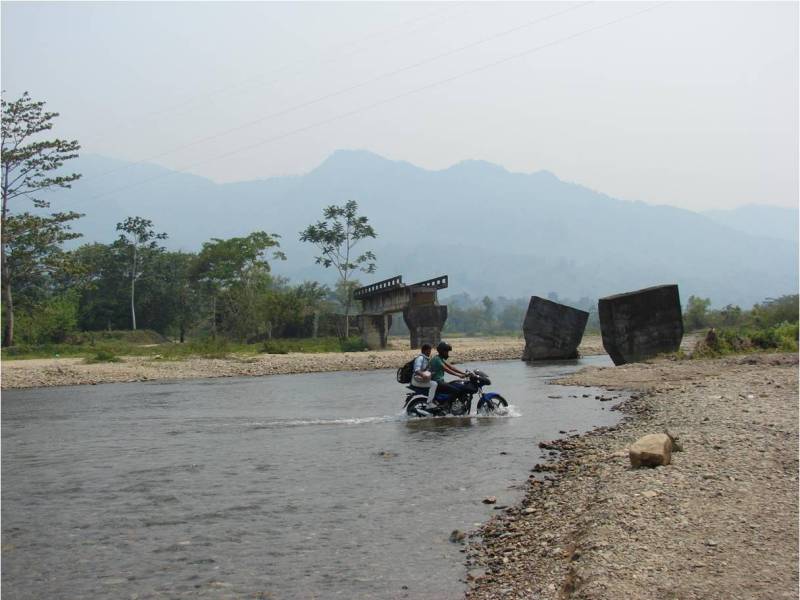
Men cross a polluted river near Nueva Esperanza (Courtesy of Justice in Mining).
Sponsored by the Jesuit Conference of Canada and the United States, researchers from Saint Louis University (SLU) and the Jesuit social center in Honduras, ERIC, studied 206 households and nine watersheds in northern Honduras. They concluded that the environmental destruction caused by mining permeates all areas of Honduran life—from water contamination, nationwide drought, and food security to education and political security.
Consequences of rapid mining expansion
A chief supplier of U.S. metal manufacturers, Minera La Victoria mining company began “exploring” Nueva Esperanza, where Enrique lives, in 2013. Claiming they were searching for iron oxide, scouting teams removed trees and dug shallow trenches without community approval. Many villagers suspected their real target was gold, which is abundant in the hills of Nueva Esperanza but illegal to extract industrially. Seeking permits for iron oxide is how companies circumvent the ban.
Nearly 60 percent of rural Hondurans, including Enrique, are campesinos, small-scale farmers. They rely on fertile land and clean water to produce marketable crops, and historically their land rights were protected by the Honduran government. Since the 1990s, however, policies have favored corporate agriculture and mining ventures, leaving small farmers vulnerable to land grabs and market volatility.
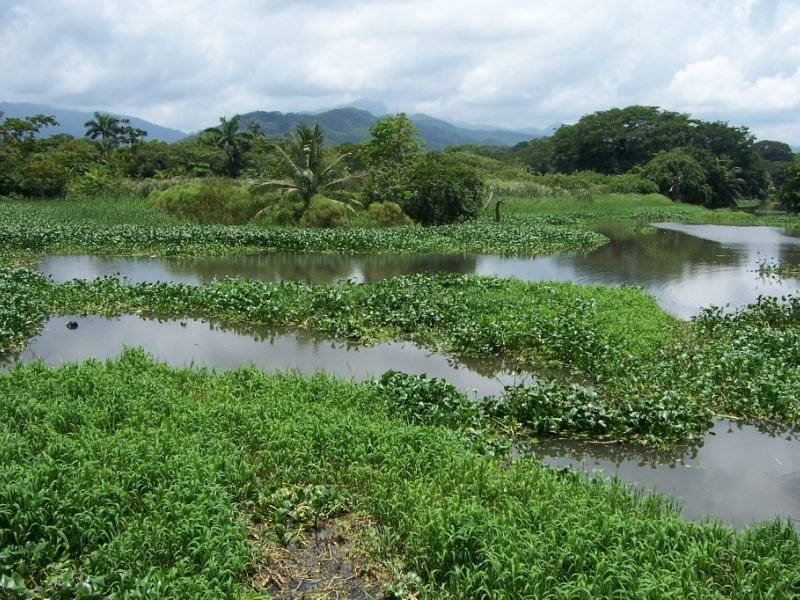
The hills of Atlántida are rich in beauty and gold, which makes it a target for international mining ventures. (Courtesy of the Jesuits of Canada and the United States)
The policy shift has disproportionately impacted Indigenous and Afro-Honduran communities, who have little political clout to block corporate incursions. Across the country, 137 mines scrape into the bedrock of Indigenous lands. Operating with little governmental oversight, they have displaced scores of families and destroyed forests and farmlands. This Jesuit network study examined 167 such mining ventures across northern Honduras and documented the resistance of communities like Nueva Esperanza.
In Honduras, many companies practice open-pit mining, systematically gouging the earth to create gaping pits thousands of meters wide. The process unleashes toxic byproduct, including asbestos and sludge, that contaminates air and water. SLU researchers took water samples from 136 households—128 were contaminated by coliform bacteria.
Mine excavation also disrupts the water table. In removing trees and shifting tons of sediment, mining rapidly erodes topsoil, triggering landslides and floods and the destruction of water-producing forests.
Combined, the consequences of unregulated mining threaten basic “human security,” according to lead researcher Fernando Serrano. Grappling with displacement, food insecurity, water contamination, and health hazards, Honduran communities are often outmaneuvered by powerful—and state protected—corporations. Those who resist mining expansion become targets for the police and state violence. Since 2010, over 120 Honduran environmental defenders have been killed for their activism.
Resisting extractive development
And yet, 35 municipalities across Honduras have declared themselves mine free. Decided through open councils, mine free declarations last three years and bar any mining development.
In 2013, 43 mines scoured the earth in Atlántida, where Nueva Esperanza is located. Development here—from logging, corporate agriculture, and ore mining—has diminished the verdant tropical forest that defines the mountainous terrain. So, when La Victoria began eyeing Nueva Esperanza for ore, Enrique and his neighbors organized to protect their community.
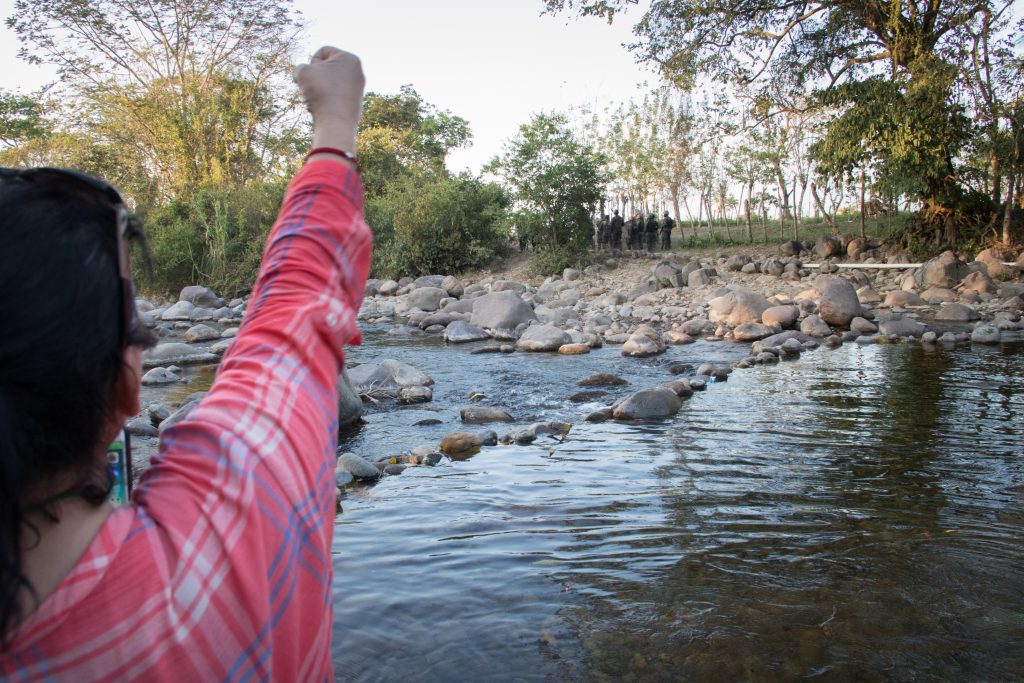
Activists in Guapinol, Honduras protest water contamination due to open pit mining. Security forces look on across the river (Courtesy of Peg Hunter).
After police cut through Enrique’s chain barrier, the community mobilized, constructing blockades to prevent La Victoria machinery from passing through Nueva Esperanza. They also drafted petitions and hosted marches. Eventually, La Victoria dropped the project, and in 2014, Nueva Esperanza, alongside 15 neighboring villages, declared itself free of mining and exploration. It was a huge victory in a region scarred by extractive industries. And it’s cause for hope.
As more Honduran communities mobilize against extractive industries, they send a powerful message to the Honduran government and international companies: Listen to us. In the past, extractive industries rarely consulted local communities, relying instead on the support of the federal courts and politicians. Towns like Nueva Esperanza show that resistance yields results. Their example empowers communities to reach for a different model of economic development and environmental stewardship.
Executive director of ERIC, Fr. Padre Melo, S.J., put it this way: “If one works with an integrated view of security in education, health, employment, and production, in the care and protection of public and common goods, without a doubt, society will need less budget for weapons and police.”
An overwhelming 90 percent of study respondents said they believe mining causes environmental problems, and a majority believe mining brings little benefit to their communities. Mining is not resolving rural poverty or resource scarcity—it’s compounding these issues. By pursuing a model that places resource management and development—of schools, infrastructure, and economies—in the hands of local communities, Honduras can combat poverty and environmental degradation.
Such a future would, as Enrique suggests, protect “the poorest people, the land, and the water.”
Editor’s Note: This story was originally published by the Jesuits of Canada and the United States.
MegAnne Liebsch is the communications manager for the Office of Justice and Ecology of the Jesuit Conference of Canada and the United States. She holds a master’s degree in media and international conflict from University College Dublin and is an alumna of La Salle University. She is based in Washington, D.C.

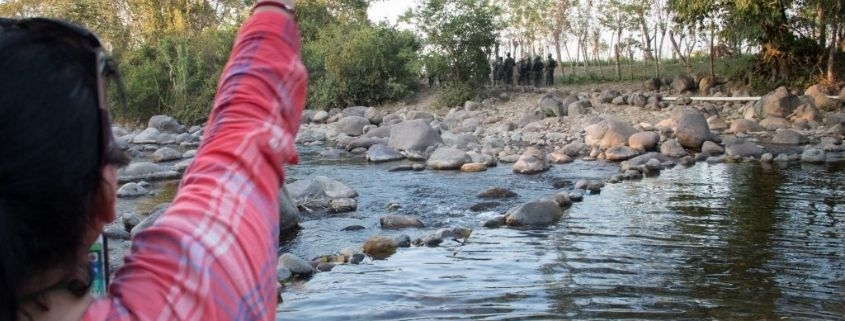

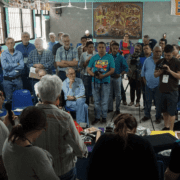
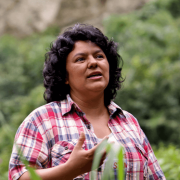
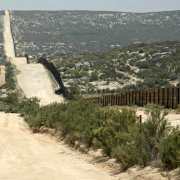
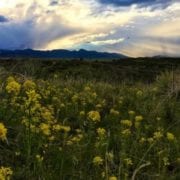
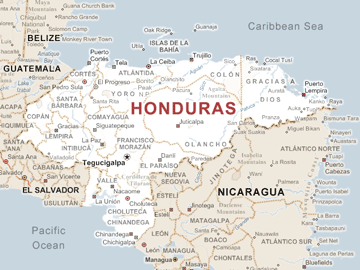

Human beings are made in the image and likeness of the divine – declare Scriptures. Poorest of the poor need respect. Their lands and water sources need protection.